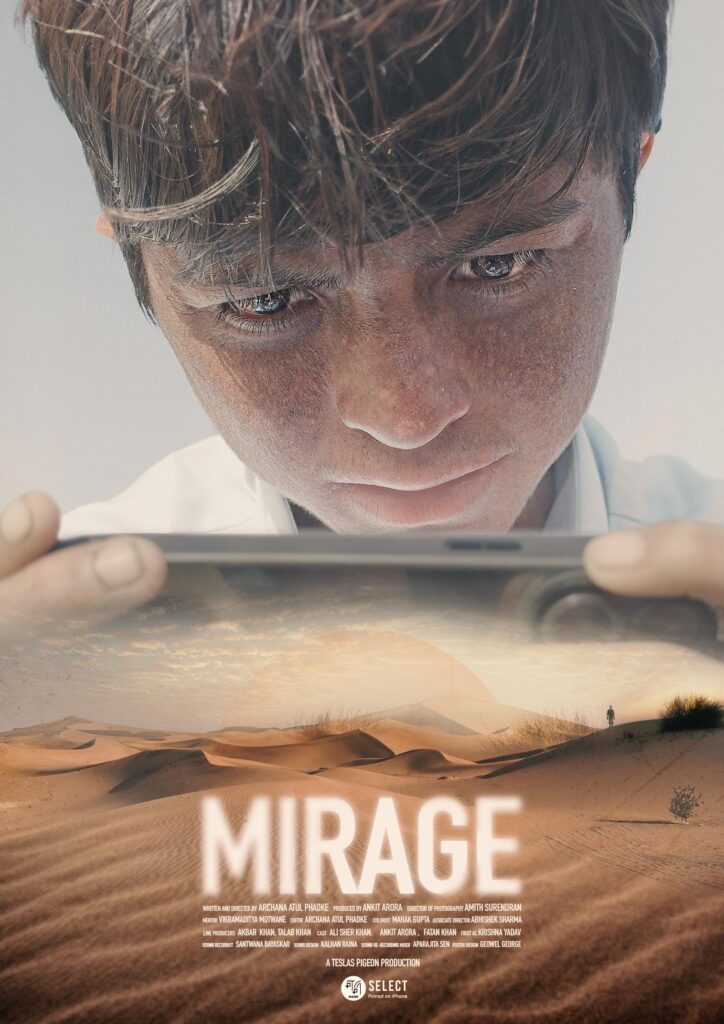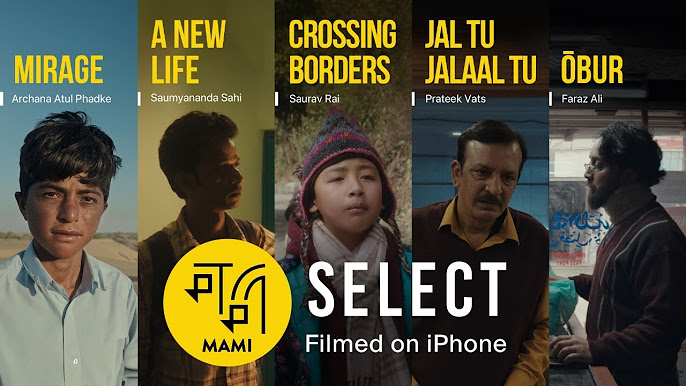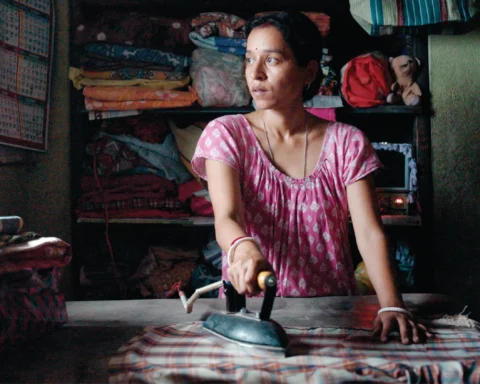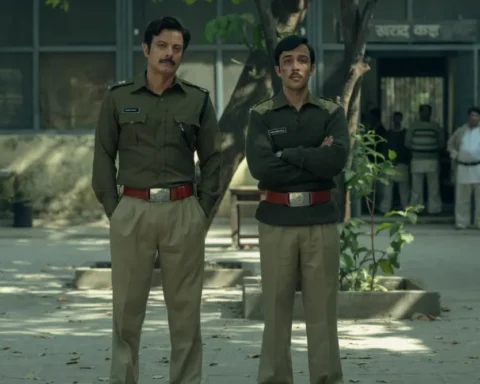MAMI Select: Filmed on iPhone is an initiative undertaken by the Mumbai Academy of Moving Image (MAMI) to make short films shot on the iPhone 15 Pro Max. The five filmmakers chosen for this virtuous deed were Prateek Vats, Saurav Rai, Faraz Ali, Archana Atul Phadke, and Saumyananda Sahi. These filmmakers were mentored by veteran filmmakers like Vishal Bhardwaj, Vikramaditya Motwane and Rohan Sippy. The five short films are tales of individuals who deal with the challenging lives of the marginalized, the vulnerable, the impoverished, the alienated, and the troubled. From the confines of a garment factory to the narrow alleys of a daily market in a rural town to the snow-clad locales of Kashmir to the dunes of Rajasthan to the bustling metropolis, they present vivid characters whose individual problems are no less vital and compelling. Small errors snowball into unintended and unimaginable consequences. As a result, the principal characters are compelled to face circumstances where they experience powerlessness as victims of disproportional situations. It reveals their susceptibility for one reason or another, simply to hold things together.
In Prateek Vats’ Jal Tu Jalal Tu (You Are Water, You Are the All-Powerful), a senior tailor in a garment factory, Madam (Harish Khanna), finds himself in an awkward situation when caught laughing hysterically by his boss (Abhishek Anicca). Madan leaves no stone unturned to beg forgiveness from the piqued employer, whom he has presumed to be offended. But after one unsuccessful attempt after another, the strings of his docility snapped, resulting in an undesirable circumstance. The struggle and the endless agony of the working class are the focal points of this film, where the factory workers have to work inhumanely to meet the deadline of an over-ambitious shipment. As the protagonist suffers from a moral quandary, the narrative gets charged with a visceral energy that makes the viewing less of a visual and emotional experience than a forceful physical sensation. The realist approach favored by the filmmaker speaks potently and persuasively about both the fictional world rendered on screen and the world that we live in. Along with his cinematographer Ravi Kiran, Vats allows the camera to become closely attached to the action and the characters. This allows the film to be shaped as a pursuit, offering frantic documentation of events that envelop us in a society that is becoming extremely selfish and materialistic.

In Saurav Rai’s Crossing Borders, we encounter two kids, Karma (Crispin Tamang) and Tashi (Tashi), and a woman, Vidya (Menuka Pradhan), who crosses the border from Nepal to India for an errand. Karma and Tashi purchase cough syrup for their ailing father and groceries for their home. Vidaya sells ghee and local medicines to shopkeepers along with smuggling electronic goods. As their paths cross, it is revealed that when push comes to shove, most human beings have flexible morals, despite their age. Through these three characters, the filmmaker examines how the ideas of home and belonging to the communities around us are formed. What makes this more than just another formulaic feel-good film is the grit with which Rai evokes the hard-scrabble lives of his characters, balancing the dreamier elements of the drama with a naturalism that keeps it rooted in reality. The cinematography by Appu Prabhakar moves seamlessly, guiding our perspective to enrich our viewing experience with immediacy and verisimilitude.
In Faraz Ali’s Óbur (Cloud), a young Kashmiri boy, Suppu (Aaqib Nazir Dindaa), pawns his iPhone to a pharmacist (Shahnawaz Bhat) in Srinagar because he cannot clear his debt of purchasing medicines for his sickly mother. All the data on his phone is saved in cloud storage. After a few days, he discovers that retrieving his data will be a mammoth task. The film’s title is a metaphor for the arduous situation in which the protagonist finds himself after the demise of a closed one and criticizes the modern habit of dependence on technology. The beauty of the film does not lie less in any grand philosophical or personal statements but more in the way Ali uses a simple tale to attune us to a subtle drama; the drama of everyday life is, the kind of drama that only the cinema could make truly dramatic. Besides the commendable performance of the young Aaqib, the meditative soundscape of Premsankar Sethumadhavan and Anand Bhansal’s evocative cinematography highlights the growing sense of desperation and helplessness of the situations that Suppu has to go through. The film ends with a scene that is deeply moving and has a blend of deep humanism and a contemplative spirit.

In Archana Atul Phadke’s Mirage, we come across a young boy, Ali (Ali Sher Khan), from Rajasthan who earns his living by selling beers and providing hospitable services to the tourists. He has only one addiction, which is playing games on his mobile phone. The film traces a day in the life of this spirited young boy who, by dusk, loses his most beloved possession and all hell-bent loose. With a rich background in documentary filmmaking, Phadke’s preference for naturalism via controlled camerawork and minimal dialogue is evident throughout. It gives the film a rare rigor, focus, and intensity. However, the film ends on a note of ambiguity, and it is disappointing due to the lack of emotional resonance it had previously built up. Ali as the protagonist efficiently communicates with the slightest nuance of expression bringing out the complex emotions within him tellingly. The sound design by Santwana Bayaskar is enmeshed perfectly into the film’s fabric and effectively transports us into the uneased mind of the protagonist. Phadke, who has also edited the film, creates a frenetic rhythm when Ali runs across the desert to find his lost device. At night the juxtapositioning of the real and virtual world in the night scene also builds up to a surreal thrill.
Saumyananda Sahi’s A New Life narrates the plight of Somnath (Somnath Mandal) from Kolkata, who comes to Bangalore for an interview. Back home, his wife (Ebong Ipsita) is expecting and is anxious about being away from her husband. Somanth arrives late for the interview and now has to wait two more days before he can return home and comfort his wife. The film has gravity, a measured pace, and a detachment resemblance to a neo-realistic approach. In one of the scenes, the protagonist, who has suffered a minor stroke, visits a clinic. In the doctor’s absence, a nurse is eager to help him. But she is stopped from doing so by her senior colleague. When Somanath breaks down in an autorickshaw, the driver sympathizes with him. Such moments make the film profoundly compassionate, deeply moving, and highly accessible. Runal Hattimattur’s cinematography elegantly frames the protagonist in close-ups, putting us in his shoes and providing the overall narrative with quasi-documentary energy. Somnath Mandal’s performance of muted solemnity makes us identify with his dilemma organically.
Traditional wisdom has it that the more culturally specific a story, the more likely it is to attain universal resonance. All in all, these five short films support that proposition and are bold and ambitiously set in a world of globally intuited emotional distress. They do so through a determined realist aesthetic that avoids explicit social comment, gratuitous narrative exposition, and clumsy explanatory dialogue. So, they are deemed worthy of our time and attention.





